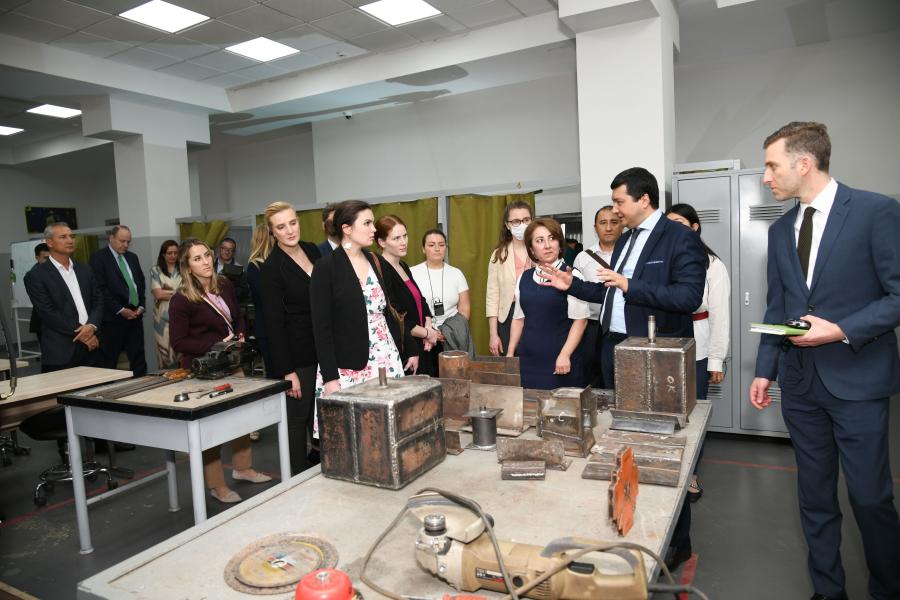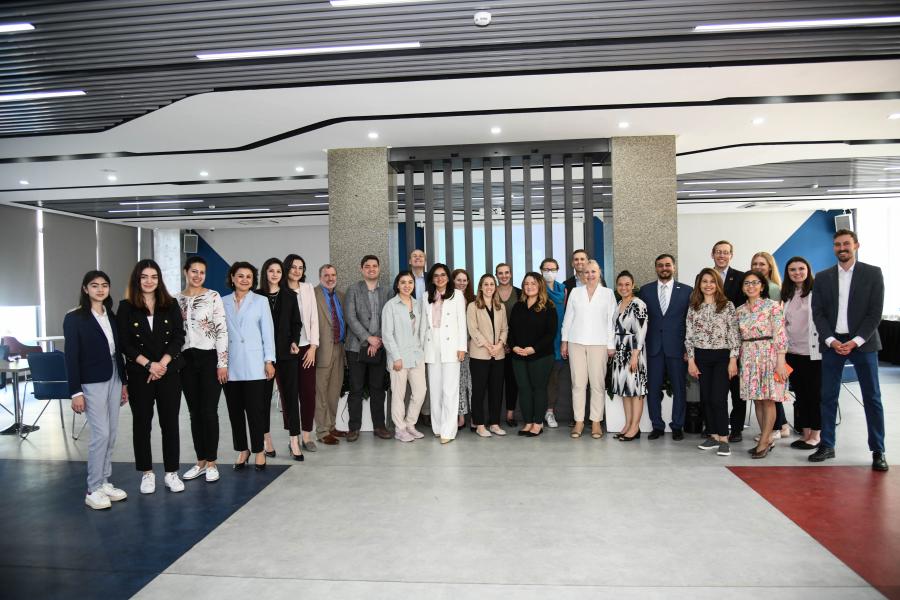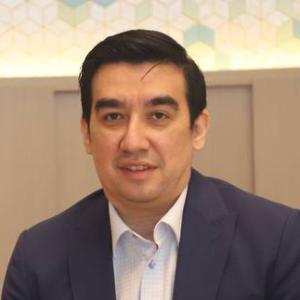The UN Foundation and the UN in Uzbekistan Conclude the Learning Trip of U.S. Congressional Staffers in Uzbekistan
16 апреля 2022
The United Nations in Uzbekistan and the UN Foundation concluded a learning trip to Uzbekistan that included staff members from nine U.S. Congressional offices. The trip, facilitated by the UN Resident Coordinator’s Office, provided an overview of the 25 UN agencies, funds, and programmes operating in Uzbekistan, as well as successful initiatives led by USAID.

The delegation toured the largest vaccine facility in Central Asia, established in the capital city Tashkent with the support of the UN Children’s Fund (UNICEF). They also interacted with young adults (age 18-30) through the UN Development Programme (UNDP)-supported entrepreneurship initiative at a monocenter (local employment center).
The group also learned about the humanitarian logistics hub in Termez, one mile from the Uzbekistan-Afghanistan border. Here the UN Refugee Agency, (UNHCR) the World Food Programme (WFP), and UNICEF facilitate the direct delivery of humanitarian supplies to neighboring Afghanistan. Through the Termez Centre for Education that the UNDP and the Uzbek government established, the group learned that there’s a unique cross-border initiative that provides scholarships and educational opportunities for Afghan women, who face barriers to education and employment in their home country.
Peter Yeo, Vice President of the UN Foundation, said: “This trip was a perfect example of how the UN, working with local governments and supported by strategic U.S. investments, can lift up a local economy and its people, including those in neighboring countries. These programs promote regional stability and prosperity, which benefits everyone.”
To further understand the work of the UN in Uzbekistan, the delegation participated in an interactive dialogue with private companies involved in the joint UN Population Fund (UNFPA) and Westminster International University in Tashkent ongoing project on “Gender Equality in the Workplace in Uzbekistan” aimed at exploring the extent to which corporate policies and mechanisms promote gender equality as well as prevent unfair treatment and gender-based violence, and support women with combining work and family responsibilities. At the Institute of Virology, the delegation interacted with HIV-positive children/adolescents and learned about the Joint UN Programme on HIV/AIDS’ (UNAIDS) work on providing psychosocial support and non-medical care services.
The members of the U.S. Congressional offices also visited the UNESCO World Heritage Site in Samarkand, which is at the crossroads of ancient cultures and home to the Bibi-Khanum Mosque, considered a masterpiece of Islamic cultural creativity. UNESCO has played a key role in helping spur economic development and job growth in Samarkand connected to the site, while also advising the government on how to best protect and preserve cultural heritage sites for the long-term. The delegation also learned how USAID has helped train 200 entrepreneurs and tour operators to benefit from the burgeoning tourism industry.
The delegation concluded their trip learning about the Aral Sea Region and the support that the UN provides through the Multi-Partner Human Security Trust Fund for the Aral Sea Region in Uzbekistan. On their last day, the delegation also visited Artel, the first-ever Central Asian company in the household appliance and electronics sector to join the UN Global Compact.
Mr. Munir Mammadzade, the United Nations Resident Coordinator, ad interim, for Uzbekistan during the time of the visit noted that “the UN agencies in Uzbekistan including the UN Office on Drugs and Crime (UNODC), the International Organization for Migration (IOM), and the International Labor Organization (ILO) were delighted to host the delegation and share the scope of work they do in Uzbekistan. The UN in Uzbekistan found the learning trip as an opportunity to show the work of the UN beyond humanitarian and peacekeeping activities.”

About the UN Foundation
The UN Foundation was founded in 1998 by entrepreneur and philanthropist Ted Turner to support the UN and serve as a strategic partner and resource for the UN in solving global problems. The goals of establishing the Foundation were to demonstrate the value of investing in the UN, encourage new partners to work with the UN, and promote strong U.S. leadership at the UN. In its first 20 years, the Foundation mobilized over $2 billion, numerous initiatives, and countless partners to support the UN and UN causes. Today, the Foundation focuses on mobilizing ideas, people, and resources to help the UN tackle some of the greatest collective action challenges of our time, including scaled collaboration to achieve the Sustainable Development Goals and the promise of the Paris Agreement on climate change.
For more information: Rusyan Jill Mamiit, Development Coordination Officer for Partnerships and Development Finance, United Nations in Uzbekistan, mamiit@un.org, +998 93 501 7838


















